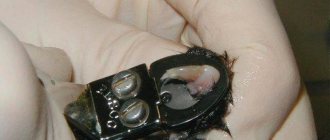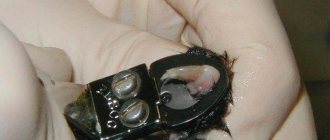Strange and wild cats on your property or in your yard can be a nuisance. Feral cats can be aggressive towards you and your pets.
Cats are natural predators and can kill wildlife such as birds and squirrels that you feed in your yard.
Outdoor cats may also dig up the yard, scatter trash, or leave feces nearby. Cat feces can leave behind parasites that infect you and your family, and feral cats can carry mange.
Effective help
In some regions it is not possible to obtain an ultrasound device.
All that remains is to try all the listed methods in the hope that one of them will be effective. If the situation gets out of control, and the neighbor’s pets don’t want to leave you alone, you need to use something that scares cats away from your summer cottage with a 100% guarantee. Today there are a huge number of products on the market that are marketed as cat repellents. Some are designed for indoor use, others for outdoor use. There are two main forms of these products: granules and aerosol. The second one shows itself best if you need to solve the problem of cat litter in the apartment. The spray is sprayed in places chosen as a toilet. In other words, you will have to spray everything except the tray. This form is not very convenient for a garden, although some walk around the perimeter every day and cultivate bushes and hedges. But it would be better to use granular formulations. They create a longer lasting effect and are easier to use. Simply scatter the granules around the perimeter of the garden and beds, as well as in places that cats have already eyed as a toilet.
Dog on the property
Since it can be difficult to drive cats away from your property, and persistent animals keep coming back every day, it is recommended to get yourself a new pet. The dog will take great pleasure in guarding the boundaries of the territory all day long and giving a pre-arranged signal if the impudent muzzle appears again from behind the fence. Usually it is not even necessary for the dog to chase them. The very presence of the “enemy” on the territory is quite enough.
By the way, a domestic cat can also be a solution to the problem, because it will drive away strangers. It is enough to accustom him to the tray and do not forget to change the filler, and there will always be order in the garden.
It's worth fighting
Many summer residents refuse to think about how to keep dogs away from their property, feeling sorry for the unfortunate animals. However, they should remember that stray flocks are dangerous for both people and pets. Moreover, the harm caused to homeless animals can be different.
In the first place, of course, are bodily injuries. Aggressive tramps sometimes attack completely spontaneously. At least for no apparent reason. And if a domestic dog is controlled by its owner (albeit often not fully), then a stray dog is uncontrollable. And his aggression is fueled by mental disorders - and they appear in the animal after a few months, or maximum after two years of homeless life. Dog attacks result in serious injuries.
Stray flocks cause no less harm to health. And everyone – from birds to humans. Even mice become infected with worms, rabies, and lichen, spreading the infection throughout the home. And skin diseases spread directly - they can be obtained by petting a sick dog (which kids love to do) or by contact with an object that he touched.
So you need to ward off someone else’s dog as quickly as possible, while there is not much chance of contracting an infection. And you need to do this before she attacks your Bobik or Murka.
Construction of a sandbox for a cat
If your pet has organized a toilet in the planted area, then this problem is easy to solve. You should offer the animal something that it cannot refuse. We need to make a sandbox for him.
The dimensions of the structure should be approximately 1 by 1 meter. It is filled with clean, fresh sand. The cat will be delighted with the new place and will quickly move his toilet.
But there is an important point to consider. If there are children in the house, then you must immediately explain to them that this sandbox is intended only for animals.
Types of repellers
Water devices can be used to repel cats in your yard. They are not suitable for the home, as they wet not only the uninvited guest, but also furniture, carpets, walls, and appliances. Ultrasound can be used to drive away cats both indoors and outdoors. But aerosol repellers are not suitable for open spaces (the smell quickly “dissolves” in the air); sprays are best used to limit cats’ access to rooms.
Water repellers
Such devices are sprinklers (water sprinklers). But unlike garden devices that turn on regularly and are intended for watering lawns and beds, repellers begin to accurately emit jets of water when motion sensors are triggered.
An example of a water repeller is Scare Crow. The device costs from 4800 rubles. The range is up to 10 meters. The sensor detects movement and sends a signal to the sprinkler, which is connected to a hose with water. The jet under strong pressure, moving from side to side, frightens a cat that has wandered into someone else's territory and forces it to hide.
The battery used is a 9 V battery, which is designed for 1000 sensor activations
The repeller works not only on cats. A device like Scare Crow is effective against raccoons, foxes, stray dogs, crows and other animals and birds. As a rule, after 1-2 “wet” attacks, the guest remembers that an unpleasant water procedure awaits him here, and no longer makes attempts to get into someone else’s yard.
Ultrasonic repellers
These devices, when triggered by a motion sensor, begin to emit sound at a high frequency. The human ear does not perceive it, but animals hear it well, and it is unpleasant for them. Ultrasonic repellers are suitable for the interior of houses, apartments, and for protecting yards. They protect not only from cats and stray dogs, they are also effective against rodents - mice, rats, moles.
Grad Duos S is an American model suitable for repelling animals less than 5 kg. The device's two speakers generate ultrasound, which is not perceptible to humans. For the animal, the sounds produced are perceived as a sudden clap of thunder. The cat hears acoustic signals at a distance of up to 20 meters. The price of the device is from 2900 rubles.
The device weighs only 120 grams and can be mounted on a wall or an inclined surface - for example, a door slope or an external cornice.
Weitech WK0055 is another example of an ultrasonic repeller. Cats do not like sound emitted with a frequency below 20 kilohertz (humans cannot hear it). Also affects rodents, foxes, small dogs, pigeons, crows. The device scans the space at a distance of 16 meters and with a coverage angle of 90° - as soon as an animal enters the zone, a sound signal is immediately triggered. The device stops “screaming” only when the animal leaves the area covered by the sensor. The advantage of the repeller is that it does not work from the mains, but from batteries, so it can be placed in any part of the apartment, house, or yard. Weitech WK0055 price - from 3500 rub.
The device has a durable, water-permeable body that is not afraid of rain, snow, sunlight and dust
Aerosol repellers
Deodorizing spray works by emitting a liquid with an unpleasant odor for the cat. It can be manual (when a person needs to “aim” at the animal and press the dispenser or treat surfaces) and automatic (the sensor detects the movement, transmits a signal to the sprayer and it sprays the uninvited guest with an aerosol).
An example of a simple repellent aerosol is BioVax. They can be used to treat rooms or individual pieces of furniture, flowers, wires so that the cat does not approach them. The base is essential oils of orange, cinnamon and pepper. The smell is quite persistent (one spray lasts for 3-4 days), but it is strong only for the first 30-40 minutes, then it becomes barely noticeable to humans, but the cat will continue to feel it.
This aerosol repeller costs from 150 rubles
Use coffee grounds
Coffee grounds are also good at scaring cats away from garden beds. In addition, it will additionally nourish the plants and loosen the soil. It contains magnesium, potassium and nitrogen. Coffee grounds also prevent the appearance of fruit flies and ants.
Coffee grounds. The illustration for the article is used under the standard license ©ofazende.com
Last resort
If all else fails, the owners of the site begin hunting for furry pets. Some watch them at the scene of the crime, others lure them with treats. After that, they give them a beating and send them back to their station. It’s not very humane, but usually after 2-3 “explanatory conversations” the cunning creature understands that retribution cannot be avoided, which means it’s better not to come here again. Of course, hunting a cat in the garden is a long and rather complicated job, so we recommend using one of the methods listed above. Proven repellent sprays from leading manufacturers will provide guaranteed results. But if it’s a pity to spend money on them (and they are not cheap), you can try traditional methods of fighting the invaders of the territory.
Do you constantly see your neighbor's cats on your property? All representatives of the cat family love to take over other people's property, hoping to find something tasty. Your garden at the dacha and folk methods can help scare away the neighbor's cats.
The neighbor's kitten is doing his thing right in the garden
4 problems in a summer cottage caused by neighbors' cats
Marking territory
A cat marks territory on someone else's property
All cats mark their territory, and doing this on a neighbor’s property has no problem for them. Animal urine and feces burn the tree bark or corrode the root system because cats mark fruit trees and the soil around them. They also leave dug holes after the job is done.
Sharpening claws on trees
A representative of the feline sharpens its claws on a fruit tree
The cat family loves to sharpen their claws, and for them it doesn’t matter if it’s wood or garden furniture
Destroy poultry
The cat caught the chick in the chicken coop
Cats are predators by nature and strive to catch prey. In summer cottages they help destroy pests in the form of rodents or chase away annoying wild birds. But this is not the limit for them; if you don’t close the chicken coop in time, the neighbor’s cat can easily gnaw off the young chicken’s neck and drag it home.
Crops are trampled in the beds and flower gardens
Cat sleeps in a flower garden
Cats love to spend a lot of time in the sun; they like flower beds or beds with tall tops. The cat leaves behind trampled crops that are difficult to revive.
4 folk ways to scare away neighbors' cats from their summer cottage
Planting aromatic herbs
Schisandra will scare away the cat
Aromatic herbs like lavender, lemongrass or eucalyptus emit a smell that cats simply cannot stand. Once they visit your site, they will never return.
The plant produces an unpleasant odor for the cat
There is also such a plant - Coleus canine, after contact with it it emits an unpleasant aroma for cats. The plant will have to be moved indoors in the winter, as it is heat-loving.
Mulch on the property that is unpleasant for cats
Mulch with coffee grounds will repel garden pests and fertilize the soil
Mulching your summer cottage using citrus peels, coffee cake or pipe tobacco will repel cats and prevent them from doing anything unpleasant for you. Mulch will also fertilize the soil and enrich the soil with oxygen.
Natural remedy from a pet store
The natural remedy, which is sold in any pet store, consists of the urine of predatory animals. Apply a small amount of the product around the entire perimeter of the area, and the cat will no longer appear. The product does not cause any harm to humans.
Vinegar-soap solution
Spray the solution in places that cats love
Prepare a solution using vinegar, liquid soap and water. All ingredients in equal proportions. Spray the fence and places on the property where cats do their business most often. After the procedure, cats will not come to your site. After rains, repeat the procedure.
Now you know how not to harm the animal and at the same time scare it away from your summer cottage.
How to humanely drive cats away from the property without causing harm to health and at the same time getting rid of their presence and antics in the yard forever is a common question asked by owners who have repeatedly suffered from the active activity of this animal. Cats are sweet, gentle creatures, and few people would think that they could cause any harm in a flowerbed or garden bed. However, many pets deliberately damage plants, so there are various methods to help drive away uninvited and annoying guests.
Fill the plantings with cones and the paths with gravel
Delicate cat paws are unaccustomed to sharp surfaces and try to avoid them. There are many insidious inventions with sharp and prickly edges, but torturing your own pet (and your neighbor’s too) is inhumane. To protect your garden beds, it will be enough to mulch them with cones or fill the paths and perimeter of the garden with fine gravel with sharp edges. The cat will definitely not walk on it and dig holes in it.
The surest way to protect your site from uninvited furry guests is to build a solid fence to the ground - it will prevent stray and neighbor cats from visiting your plantings, and you will be able to pacify your own pet.
Cats in apartment buildings
Flocks of stray cats can be found in almost every courtyard of an apartment building. Moreover, such a neighborhood often causes a lot of inconvenience to apartment owners, ranging from an unpleasant odor to various diseases (lichen, toxoplasmosis, etc.), which are carried by representatives of the cat family.
Thus, the appearance of homeless animals at the entrance often becomes a problem, which is sometimes not so easy to get rid of.
How to get rid of neighbor cats that shit under the door or on the landing
As noted above, cats living in the courtyard of an apartment building bring a lot of trouble to its residents. At the same time, the main problem is related to the spread of an unpleasant odor and contamination of the landing with the waste products of these animals. In this regard, many apartment owners are wondering - what to do to get rid of uninvited guests who have bothered all the residents?
So, the following recommendations will help you ward off abandoned cats forever:
- First of all, it is necessary to remove any source of food - you should understand that until compassionate neighbors stop feeding the cats, they will still live near the house and regularly go for food.
- You can inform a specialized service for catching stray animals, which will be required to respond to the signal.
- Another measure is to block all paths through which an animal can enter an apartment building. This is mainly the entrance door to the entrance (it should always be kept closed), windows on the stairs on the first floors (bars can be placed on them), etc.
In practice, another situation occurs when a neighbor’s cat regularly comes to a specific flight of stairs or under the door and relieves itself there.
There are several options to solve this problem:
- First of all, you need to talk with the owners of the animal and ask them to resolve this issue.
- If the cat's owners do not take any action in such a situation, you can write a complaint to the organization that performs the functions of managing the high-rise building (MC, HOA, etc.).
- Another option would be to file a lawsuit. The basis in this case will be the creation of unsanitary conditions (Article 6.3 of the Code of Administrative Offenses of the Russian Federation), as well as violation of the rights of owners of other apartments (Article 304 of the Civil Code of the Russian Federation).
- You can try to stop your cat from shitting in the wrong places on your own. For example, treat the area in front of the entrance to the apartment with bleach, buy special products at the pet store and apply them to the landing.
How to attract a neighbor for feeding cats
Currently, feeding stray animals, including cats, is not prohibited at the federal level. However, such a ban applies on the territory of some constituent entities of the Russian Federation. Moreover, in case of failure to comply with this requirement, an administrative fine will be collected from the violator.
For example, in accordance with clause 3.5 of the “Rules for keeping pets on the territory of the Ochersky urban settlement,” citizens are prohibited from feeding stray animals. A similar restriction also applies in the city of Verkhnyaya Pyshma, where it is not allowed to feed animals in common areas of apartment buildings (on the platform near the stairs or elevators, in basements, etc.).
In order to punish a neighbor who regularly feeds cats, you must act as follows:
- First, you need to make sure that such an action is prohibited in a particular region of the Russian Federation.
- Send a complaint to the city administration.
- After considering the received complaint, appropriate measures will be taken against the violator.
If you can’t catch your neighbor for feeding stray cats (due to the absence of such an offense in a particular region), then you can write a complaint against her about the creation of unsanitary conditions (cats shit on the stairs, shed, etc.).
According to Art. 6.3 of the Code of Administrative Offenses of the Russian Federation for violation of sanitary and epidemiological standards provides for a warning or a fine of 100-500 rubles (for citizens).
Another option is to file a claim in court for violation of the owner’s rights.
Other people's cats come through the cat door
If you have pets, then such a door is a real lifesaver. Pets come and go at their own discretion, without causing inconvenience to the owners. And suddenly the latter begin to notice with surprise the unpleasant smell in the room. After observing the territory, they realize that the neighbors’ pets come to them through the small door at the bottom of the main one. At the same time, they eat the “aboriginals” and leave odorous marks. What to do in this case? It happens that pets do not want to chase strangers, and the owners themselves have to take on this. Consider installing modern devices.
Favorite “Cats” in our summer cottage or how to scare cats away from the garden beds
Cats at the dacha spoil the beds with crops - this topic arises every time you go to the dacha, taking your pet with you.
Cats at the dacha adapt in different ways: some don’t leave the house for a long time, others follow their owner’s heels. But this article is for those who have a cat, from a change of place of residence and the heady aroma of fresh air, begins to run around and jump over the newly planted plants.
Our cats do this from new experiences and encounters with unfamiliar smells and creatures: butterflies, insects, birds, etc. And, it happens that animals not only play and jump on the beds, seedlings and flower beds, but also dig holes for themselves, arranging cat litter. How can you secure your plantings (scare away cats from your garden beds) without making life more difficult for your cats?
We offer you a variety of methods. Some will help you, some will not, perhaps a combination of several methods will help.
- Water the beds so they are always moist.
- Cover the plantings with non-woven lightweight material, raising it above the ground by at least 40 cm, placing sticks.
- Stick dry twigs crosswise along the edges of the bed, something like a mini-fence. Such a fence will certainly help, although it will be a slight inconvenience for you when weeding the bed.
- Cover the beds with cuttings of branches from rose hips, roses, any thorny bushes or spruce branches. The cat will definitely not go to such a flowerbed or bed for some time; over time, your pet will develop the habit of NOT going there.
- Crumble dry bay leaves over the beds. Or scatter coffee cake over the beds. Strong aromas will scare away cats from the garden beds; it is also an additional “energy” for plants!
- The pungent smell of lemon, pepper, and garlic will also scare away the cat. You can crumble these seasonings over the beds, or you can spray the plantings with a garlic-lemon solution once every two days.
- Make “high beds”, sometimes this helps.
- To prevent trees from turning into “scratching posts,” wrap their trunks with netting.
- Also stretch a special “bird net” over the garden bed. It is lightweight and will not damage your plantings. The mesh will also protect against pest butterflies.
- Use mulch: sawdust, pine needles, open pine cones. Kitties will not like to walk on “prickly” soil.
- Try to create a cat corner in the garden for your pets. Determine a place for them, put your favorite toys there; when the cat plays there, encourage her by saying kind words and stroking her fur. Plant catnip, wormwood, valerian or catnip nearby. Build her a “play corner” from stumps and suitable trees.
- Don't plant poisonous plants!
- Radical methods: if all else fails!
Buy a special cat repeller
Remember that a cat can dig up not only your crops, but also your neighbor’s. Be friends with your neighbors! Or make special enclosures for cats, mesh tunnels for walking.
Cats are natural hunters and there is no point in weaning or scolding them for damaging crops and beds. Be patient, periodically inspect the area and, with cat-like calm, eliminate traces of the murky mess.
- Should you let your indoor cat outside?
- Devon Rex
- We are preparing the cat for the trip, the cat is going to the dacha, the cat is at the dacha, the cat is going to the dacha
- Persian cat
Features of smell in cats
Cats use their sense of smell not so much for hunting as for social interaction.
Urine, secretions from glands located on the muzzle and near the anus, sweat left by paws on the path - all this carries for the animal a lot of detailed information about other cats living in this territory: their claims to dominance, readiness to mate, state of health , moving around the territory, etc.
60–80 million olfactory cells help cats perceive a subtle and rich range of aromas (humans have only 5–20 million). In addition, these animals have a special organ called Jacobson's tube: two narrow canals that begin behind the upper incisors. To sense the smell with their help, the cat usually slightly opens its mouth.
A cat's olfactory system is different from a human's.
There are several versions about the main purpose of the Jacobson tube. In particular, it is assumed that animals with its help:
- “analyze” the chemical composition of food;
- looking for sexual partners;
- detect subtle chemical changes in the air that anticipate cataclysms such as earthquakes or volcanic eruptions.
It is not surprising that a cat can clearly perceive odors that a person cannot even smell, and that some aromas that are pleasant to humans may seem too harsh and strong to the animal.
"Scented" ways to repel cats
Before you start looking at scents that repel cats, we suggest you try a method using a scent that attracts them. This is catnip or catnip. A very beautiful plant that will decorate the area with multi-colored inflorescences throughout the summer. Cats simply love this smell and will happily settle into a corner planted with catnip: sleep there, chew the leaves of the plant, etc. And if you add a little dry sand there, the cat (with a high probability) will prefer to go to the toilet in this place rather than in the garden. Catnip requires virtually no care. Planted in a sunny, dry place, it will overwinter well and will again reproduce by self-sowing. In addition, fresh young catnip leaves can be used as an aromatic flavoring additive in soups and salads, and dried ones can be used in herbal teas.
There are a number of odors that cats find unpleasant. This means that you can make cat repellers with your own hands. Let's look at the most effective of them:
Some plants will be an excellent deterrent. So, a cat will not get into the habit of entering a garden in which eucalyptus, lemongrass, and lavender are planted. These plants will perform two functions at once: they will decorate your area, as they have a beautiful appearance, and they will work effectively as a repeller, because cats hate their smell. Coleus canina or Coleus canine will also be an excellent repeller for cats. It is believed to emit an odor that is unpleasant for cats when touched. This plant is quite heat-loving, so in the autumn-winter period it should either be brought indoors or replanted every year.
Some plants will act as natural cat repellers
- A great way to repel cats is to mulch the soil with citrus peels, coffee grounds and pipe tobacco. Treat the soil with these products in places that you would like to leave untouched by cat paws (between beds, near flowers or bird feeders, etc.). Cats will not really like the smell emanating from the soil treated in this way, but it will be very useful for the soil itself, because citrus fruits, tobacco, and coffee are able to absorb nitrogen and convert it into oxygen, which supplies the soil.
- If none of the above methods help, then you can move on to “heavy weapons”: use a special cat repellent, which is sold in pet stores. It usually consists of predator urine. It will be enough to apply a small amount of this substance around the area and the cat will no longer poke its curious nose.
Advice. If you don’t want to add to the hassle of creating fragrant “repellents” and at the same time would like to keep your beautiful garden intact, then try using a quick and affordable method: place small (or decorative) stones throughout the garden. This way you will limit the cat’s physical access to the soil and over time it will simply stop coming to your site.
You just learned about some smells that cats simply cannot stand. The information obtained will help you prevent the pranks of the furry “robber” on your site without harming the animal. Have a good fight!
Troubleshooting and Positive Remedies
If the problem with the wrong place for the toilet arose not in a kitten who has not yet understood the rules of behavior in the house, but in an adult animal that previously behaved “decently”, first of all it is necessary to understand the reasons for what is happening.
The most common factors are:
- resentment, stress, lack of attention (they can also cause other dirty tricks);
- unsuitable smell of the filler or its texture;
- the tray is too cramped, shaky or uncomfortable, it is not cleaned in a timely manner;
- a noisy, crowded or drafty toilet area;
- diseases - cystitis, kidney stones, diabetes, hepatitis, tumor, etc.
If you have tried 3-4 repellents, but your pet has not responded to any of the smells at all, you should take him to the vet as soon as possible.
If the problem lies in the fact that the animal is simply not accustomed to the right place, educational measures will be much more effective if, in addition to the “stick,” you also use the “carrot.”
The following methods may be effective:
- to accustom an animal to a scratching post or bed, place a toy with catnip (catnip) next to it;
- The same plant can be planted outside - it will distract the cat from other parts of the garden;
- buy a pot of cat grass or sprout oats so that your pet gnaws on them rather than indoor flowers;
- spray the tray with a special product that “tells” the animal that the need should be relieved in this particular place.
Valerian should not be given to cats - it often causes digestive disturbances, including vomiting and diarrhea, and can provoke real hallucinations and aggressive behavior of the animal.
If your cat is eating flowers due to a vitamin deficiency, cat grass will correct the problem.
In order to wean your pet from bad habits with the help of odors and without harming him, you need to take into account many factors - the individual characteristics of the animal, his state of health, the reasons for incorrect behavior. You may have to try several remedies before finding one that works. However, an integrated approach and patience will help solve the problem.
What smells do cats not like?
With the arrival of warm summer days, gardeners move to their dachas and take their beloved pets with them - they can’t leave cats in the city. However, they cause a lot of trouble in gardens.
- Beds and flower beds are often used by animals as toilets. At the same time, cat feces are dangerous for plants; they can destroy both flowers and vegetables. In addition, cats are territorial animals. Instinctively, they leave marks with urine on the borders of their properties, and this also does not bring much benefit to the plantings.
- Cats love to roll around in soft, cool vegetation. Moreover, it does not matter at all whether it is lawn grass, carrot tops or a flower bed with pansies.
- Cats often use the bark of fruit trees as a scratching post.
- Cats are known to be good bird hunters. Therefore, summer residents who specifically attract birds to their plot are unlikely to like the reaction of their pets - a large cat is no less capable of causing mayhem than a predatory fox.
In addition to your own pets, neighbors may appear on the site.
Plants
You can stop your cat from dozing in the club by planting lavender. This is a beautiful ornamental plant that is completely harmless to humans. However, the pungent odor causes disgust in animals. If you plant these flowers around the perimeter of the site or in the spaces between the rows, then cats will stay away from such plantings.
In addition, cats cannot tolerate the smell of laurel. Its crushed leaves can be scattered throughout the territory of good luck, and then you will not be in danger of being invaded by animals. Cats have a similar dislike for citrus fruits; in the fight, you can use aromatic oil of orange, lemon or grapefruit.
But mint needs to be used differently. It attracts cats, so it needs to be planted as far as possible from cultivated plants.
In this case, it will distract the attention of the animals. Valerian has a similar effect, and for many cats it has an even stronger effect than mint.
Spices
You can make a simple and cheap remedy for repelling representatives of the cat family yourself. The fact is that these animals cannot stand the aroma of certain spices. For example, a mixture of turmeric, ginger and ground cayenne pepper will keep furry pets away from the garden beds for a long time. You just need to pour these seasonings into small containers and place them between the rows. Black pepper has similar characteristics - usually the powder is scattered near paths or used to mulch the soil between the beds and near the flower bed.
Vinegar and ammonia
An effective repeller comes from a mixture of vinegar, ammonia and any other liquids with a pungent odor. Cats cannot stand this aroma and avoid its source. All that is needed from the owner of the plot is simply to wet the rags and scatter them throughout the garden. However, it should be borne in mind that the smell disappears in the air, so the treatment should be repeated daily.
Mustard
Mustard powder is very inexpensive, and the benefits from it will be undoubted. Dry mustard is scattered around the bushes and between them. Cats are afraid of this smell and look for other places to rest and relieve their natural needs. After watering or rain, the manipulations should be repeated.
Mr. Cat warns: danger to people
Rut oil is an effective remedy in the fight against bad habits of cats. But you need to know that if it is used in excess, the owners may experience unwanted reactions from the skin:
- development of allergic scabies;
- the appearance of urticaria;
- signs of allergic dermatitis.
When using this oil, you should adhere to the rule - the less, the better.
How to get cats out of the basement
In urban areas, cats usually settle in the basement, it is warm there, people appear infrequently.
- Chopped onions and garlic (lemon or tangerine peel) scattered around the basement will quickly wean them off.
- Repellent solution: stir a few tablespoons of ground black pepper in 500 ml of hot water, let it brew, pour into a spray bottle, and spray in the corners.
- Spraying with vinegar will cause cats to go into shock.
In the basement, cats do not bother anyone, but if the basement is dirty and damp, cats can get sick:
- fungal diseases
- dermatological diseases
- chlamydia.
Plus they can carry rabies and other diseases. This danger appears if there are rats in the basement, which cats hunt. Furry hunters often die because rats are poisoned with poisons to which they are immune.
In this case, the responsibility of the housing office is not to exterminate cats, but to bring the basement premises into decent shape. Treatment against insects and rodents will prevent the spread of all the unpleasant things listed above.
Cats are distrustful and will not be picked up, so stories about infected children have no basis.
As for worms, this is a common problem that is only remotely related to cats. Most children become infected with worms, and prevention of infestation must be carried out regularly, regardless of the presence of cats somewhere in the basement.
Odor protection from tags
The cat’s sensitive organ of smell is irritated by strong, pungent, “burning” odors. With the help of strong-smelling plants, you can protect the beds where the cat gets into the habit of lying, or house flowers, furniture in the house:
- Plants lose their attractiveness to the mustachioed robber if you put a layer of coffee grounds in the pot or wipe the leaves with an aqueous solution of lemon oil.
- Cats also avoid pots located near an orange or lemon bush.
- If you spray furniture, carpets, and curtains with a few drops of grapefruit, tangerine, orange, ylang-ylang, and patchouli essential oils diluted in water, then the cat will temporarily lose the desire to sharpen its claws on them or make an additional toilet.
- Placed pieces of onion and garlic also repel cats. But the owner is unlikely to like the pungent smell of phytoncides from these plants.
How to keep cats away from your property
Nowadays, agents are used that irritate the sense of smell of tailed animals. Among the special preparations sold in specialized veterinary pharmacies and pet stores, spray preparations are used: Antigadin, Anti-cat, etc. They spray fences and beds with them. Their only drawback is that the preparations are quickly washed off by rain, which is why re-treatment is required every time after rain. The drugs are not cheap and many people may not like this method.
Cats are animals that walk on their own. It may make sense to direct them in the “right” direction, luring them with their favorite scents, for example, valerian. Select a small piece of land, away from your beds, and water it with diluted valerian tincture. You can plant valerian, cats will be happy to go there.
Use aromatic oils
It's not just the scents of flowers that can drive a pet out of the garden. Other strong odors may also be useful for this purpose.
If you do not want to plant lavender among the beds, then you can treat the perimeters of the plantings with aromatic oils. The scent of mint, rosemary, lavender, citrus, and cinnamon is suitable. These aromas can keep a cat away from the garden for a long time.
You can also try using professional sprays. They contain the urine of predatory animals (wolves, foxes). This smell is also good at repelling cats.
Traditional methods
It remains to discuss two traditional methods of fighting cats:
- Declare war on them and hunt for the furry robber, and when you catch him, give him such a beating that he will avoid the area. This will require hunting passion, patience and enthusiasm. But remember what a hunting drive is!
- Get a dog on the property. Then she will hunt for cats, and at the same time trample down your beds and flower beds. But since this is your dog, these losses will not cause such a flow of negative emotions in you.
If our article helps you cope with the dominance of cats, then we will consider our task completed.
What to do if this doesn't help
Follow the animal, through what loopholes it makes its way. If it's a hole in the fence or a gap, stuff rags with glass wool into it. It will not cause harm, but will irritate the skin and become unpleasantly itchy. To stop thinking about how to drive away the troublemaker, place a motion sensor sprinkler on your lawn or between plantings. As soon as the tailed one appears in his sight, it will be sharply watered with cold water. It is unlikely that he will want to return again.
If you like to wake up to the sound of birdsong, place bird feeders in a visible place. It makes it easier to fly away from a predator. If all else fails and he insists on coming back, buy a cat repeller. An effective way to stop people from coming and asking to come into the house. It is not noticeable to a person, but the cat will hear a sharp, prolonged sound, get scared and stop visiting its favorite place.
Ultrasonic dog and cat repeller











